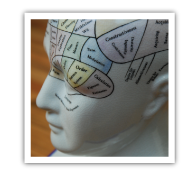
- Neuropsychological Assessment
- » Attention Deficit Hyperactivity Disorder
- » Learning Disability & Educational Assessment
- » Traumatic Brain Injury
- » Sports Injuries
- » Dementia & Age Associated Memory Impairment
- Therapy & Psychoeducation
- » Post Traumatic Stress
- » Depression
- » Anger
- » Grief & Loss
- » Anxiety
- » Chronic Pain
Mood & Mental Health
Psychologists are trained in the evaluation and treatment of the biological, psychological, and social factors that affect both health and mental health. If you're not sure whether you or someone else needs a diagnostic consultation with a mental health professional, the best thing to do is ask a psychologist.
Here are just a few examples of when someone should consult a psychologist:
» When behavioral, emotional, or cognitive problems are causing significant distress and/or are disrupting normal living,
» When someone is having persistent, or serious relationship problems with someone important in their life (spouse, partner, boyfriend, girlfriend, parents, child, boss),
» When a person is overwhelmed, stressed, exhausted, confused, or extremely frustrated with problems they have not been able to resolve on their own,
» When someone feels very sad or hopeless, is sleeping or eating more or less than usual, has lost motivation and energy, or has no interest in normal activities,
» If a person is extremely anxious or worried, has problems managing their impulses or behavior,
» When children or adolescents are having persistent problems in school, are engaging in high-risk activities, or can’t make friends,
» If someone is having difficulty functioning at work or doesn't seem to be able to keep a job,
»
When an individual is having difficulty concentrating, making decisions,
dealing with
distractions, can't pay attention, loses things or gets lost.
Behavioral and mental health assessments are often critical to arrive at an accurate diagnosis, greatly improving treatment focus, rehabilitation efforts and positive outcomes.
Mental health assessments are frequent done prior to making any diagnosis or development of a treatment plan. They typically involve a review of medical and social histories. Release of information forms are frequently requested if prior records are identified as important to your treatment goals. A brief mental status exam is administered to assessment cognitive function and a patient may complete some self-report measures of mood and coping style. Once complied, a feedback session will review the results and develop a treatment plan to help get you to your desired levels of functioning.
-

- Dr. David Knopes, Ph.D.
- » Contact & Appointments
- » Education & Experience
- » Memberships, Licensure & Professional Ethics
- Resources
- » Fees & Insurance
- » Forms
- » Confidentiality
- » Emergencies
![]()
© 2014 Sound
Psychology, Dr. David Knopes, Ph.D. All Rights Reserved. Website Design
by TenTen Design Studio.